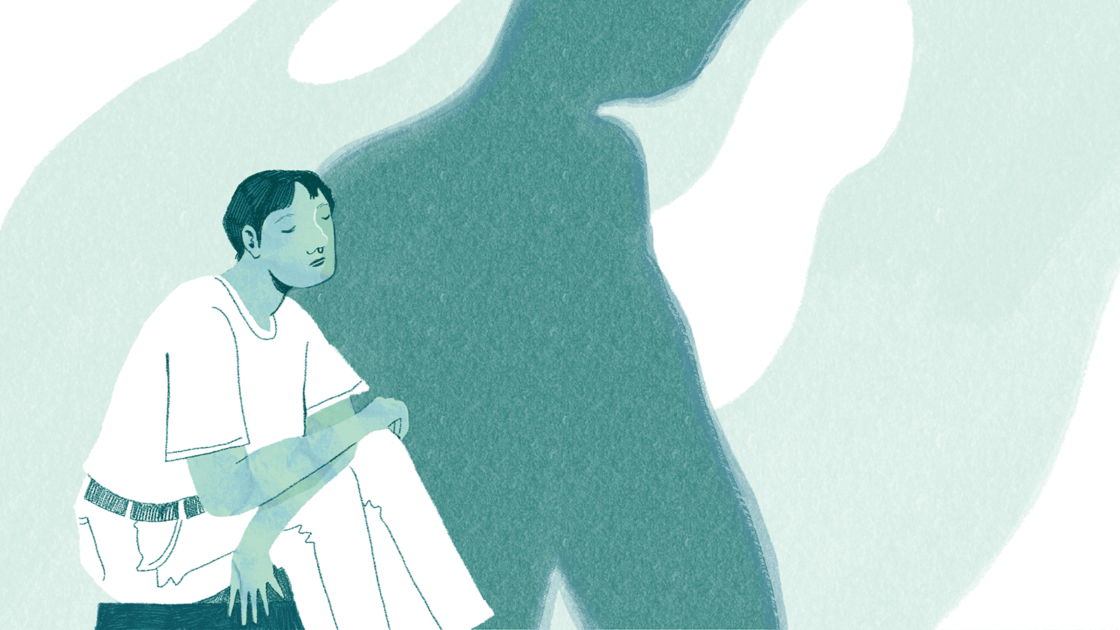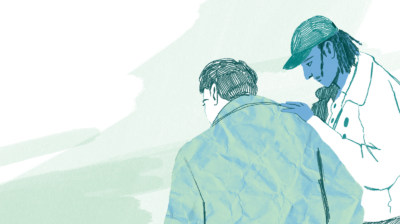Why do people sometimes feel guilty or angry after a suicide?
Suicide bereavement can bring up distressing emotions. Understanding how people can react to suicide can help you on your grief journey.

Losing someone to suicide can have a significant impact on many aspects of your life. You can experience a lot of distressing and confusing thoughts and feelings as you try to make sense of what has happened. Sometimes, your reactions to suicide bereavement can be unexpected and you might not be sure why you’re thinking or feeling the way you do. However, what you’re experiencing may be more common than you think. Whatever you’re going through, know that you are not alone.
Each person who loses someone to suicide will be affected in their own unique way and everyone has their own way of expressing and managing their feelings. One person might find it useful to talk about what they’re experiencing but someone else might not be ready to talk. Some people find crying helpful, while others will find it very difficult to express themselves in that way. This article discusses some of the ways people can react when they have lost someone to suicide. If you relate to any of these experiences, know that you are not alone. With the right support, these experiences can ease over time and you can find ways to cope with them. It’s also ok if you don’t relate to any of these experiences. It doesn’t mean that you didn’t care about the person who died or that your grief is any less valid. There is no ‘wrong’ way to grieve.
Experiencing shock and feeling numb after losing someone to suicide
Many people experience feelings of shock when they lose someone to suicide. Experiencing shock is particularly common in the first days and weeks following the loss. The initial wave of pain and disbelief can be overwhelming. It’s difficult to process so many intense emotions at once, so shock can help to protect you from them initially until you have time to work through them. When you’re experiencing shock, you may feel numb and detached from what’s happening around you or find it difficult to complete routine tasks. You also may find it difficult to recall memories from a time when you were in shock. While you might not feel much emotion when you’re feeling numb and in shock, it doesn’t mean you’re not grieving.
Anyone can experience shock when they hear of someone dying by suicide, even if they didn’t have a close relationship with the person who passed. Being in shock can be distressing, especially if you haven’t experienced it before, but know that it’s a common and understandable part of grief and usually passes on its own with time. Although it’s most common in the earlier stages of grief sometimes shock can be more long-lasting. If you are worried that you’re experiencing shock that isn’t easing over time, you might benefit from some extra support. Our article on how to find support for suicide bereavement can help.
Feeling guilty after losing someone to suicide
Losing someone to suicide is different to other forms of grief in many ways. It’s common for people to experience guilt and regret when they lose someone to suicide. Many people spend a lot of time wishing they could go back in time to try and prevent what happened, or worry if something they said or did played a role in their decision. These thoughts and feelings can be particularly upsetting and difficult to deal with. However, it’s often impossible to fully understand the complicated series of factors that contributed to someone’s suicide. You are not responsible for another person’s life and often aren’t any outward signs that someone is thinking of suicide.
Sometimes, as time passes, people can feel guilty when they find themselves in moments of joy or relief. You might feel a wave of guilt if you catch yourself laughing or enjoying yourself. It might feel like you are supposed to be sad or you may worry that being happy means you are forgetting the person you lost. Neither of these things is true. You still deserve happiness and people can experience joy even in times of great sadness. The length and depth of your sadness does not represent how much the person you lost meant to you.
Feeling confused after losing someone to suicide
In the aftermath of losing someone to suicide you will likely be experiencing a surge of emotions all at once. These waves of emotions can come and go, sometimes unexpectedly. This combination of different feelings can be overwhelming and leave you feeling confused. You might not know where some of your emotions are coming from and it can be difficult to put words to how you’re feeling. These intense waves of feelings can make it difficult to concentrate and make decisions, and you might not be sure what you can do to feel better. Untangling your thoughts and feelings after losing someone takes time. Talking to someone you trust, like a friend, family member or therapist, can be really helpful in this process.
Feeling angry after losing someone to suicide
Anger is a challenging emotion to deal with and can be a common part of grief. Anger can take many forms while grieving. You might feel angry at the things that caused the person you lost to suffer. You may feel angry at the system that failed to address their needs. Sometimes people also experience anger towards the person they lost because they feel abandoned by them, or towards people in their life for not being able to prevent what happened. It’s understandable to feel angry at the person who has died, even though they can’t be blamed for what happened. Even if it isn’t logical, anger is a part of many people’s grief journey and it’s okay to acknowledge this feeling in ways that don’t hurt others.
Not everyone will process their anger in the same way. Some people find sport helpful, for others just shouting out loud and releasing the feeling may be helpful. Sometimes just talking about the feeling can ease some of the pressure. As you’re working through it, keep in mind that anger can have an impact on the people who are supporting you. Be patient with yourself and give it time. If you are worried that your anger is getting out of hand and you are finding it difficult to cope with it, seeking extra support to develop new strategies for managing your anger could help.
Asking questions after losing someone to suicide
Losing someone to suicide can lead to a lot of unanswered questions. “Why did they feel as if they had no other options?”, “Why did they not tell anybody about what they were going through?”, “Why didn’t I see any signs?”. This may lead you to examine the weeks and even months leading up to their death, searching for clues that might offer more insight. You may have already known that they were going through mental health difficulties or were experiencing thoughts of suicide, but that doesn’t make losing them any less shocking and you can still be left with questions. Often, the questions people have following a suicide will never have a certain answer and this can be frustrating, but it’s still ok to ask them. Questioning is a natural and important part of suicide grief. It’s your mind’s way of trying to make meaning out of what happened. Ask questions until you have arrived at answers that you can sit with for a while, or until you no longer need to know the answers.
Experiencing stigma after losing someone to suicide
With a much greater emphasis being placed on mental health in our society, people are having more conversations about suicide than ever before. That being said, there is still much work to be done and there is still stigma surrounding suicide in Ireland. This stigma can show up in a number of ways. It can lead to people saying misinformed, judgemental and hurtful things about the person who died. It can also lead to people making inappropriate assumptions about why the person died. Some people may even have good intentions but only make things worse because of their approach. Stigma also leads to many people not being comfortable talking about suicide. People in your life may avoid talking about the person you lost because they aren’t sure what to say or don’t want to upset you. This can be damaging and leave you feeling isolated if you want to talk about them. This same stigma can hold people back from talking about loved ones who died by suicide.
Stigma is often grounded in misinformation. Learning about the common myths about suicide and reading our article on why suicide isn’t selfish can help you feel empowered to respond to stigma when you encounter it in your life.
Experiencing suicidal thoughts after losing someone to suicide
When someone experiences the trauma of losing someone to suicide, it can cause them to experience their own suicidal thoughts. This is common and it is understandable for someone to think about the method of their loved one’s death, and visualise what that might have been like. However, if you are feeling overwhelmed by this and having your own thoughts of suicide, there are things you can do to manage and overcome them. You also don’t have to deal with suicidal thoughts on your own. Some people find it helpful to talk to someone they trust about what they’re experiencing. If you would prefer not to talk to friends or family, there are people out there who want to help support you through this. There are a range of support services across Ireland that help people who are thinking of suicide. The pain of losing someone can sometimes be so intense that you feel like you can’t survive but know that you can survive, and the right support can help.
Feeling overwhelmed and want to talk to someone?
- Get anonymous support 24/7 with our text message support service
- Connect with a trained volunteer who will listen to you, and help you to move forward feeling better
- Whatsapp us now or free-text SPUNOUT to 50808 to begin.
- Find out more about our text message support service
If you are a customer of the 48 or An Post network or cannot get through using the ‘50808’ short code please text HELLO to 086 1800 280 (standard message rates may apply). Some smaller networks do not support short codes like ‘50808’.






